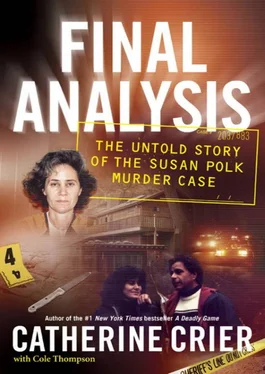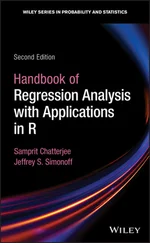It was 11:25 AM when a hush fell over the courtroom.
Fighting back tears, Susan turned to look for her sons in the gallery. Adam and Gabe were sitting shoulder-to-shoulder in the front row, the Briners by their side. Valerie Harris was in the courtroom, but not yet in her usual chair.
“Turn off all cell phones and Blackberrys,” the bailiff instructed. “No one is permitted to leave before the jury.”
“Count one,” clerk Nancy Chertkow read aloud from the verdict sheet. “Not guilty on the charge of murder in the first degree.
“On the count of ‘use of a deadly weapon,’” the clerk said “Not guilty.”
Susan looked astonished and just a bit hopeful. Then the clerk continued.
“Lesser count one, guilty of murder in the second degree,” Chertkow announced. “Use of a knife, true.”
Susan sat expressionless as the guilty verdict resonated in the courtroom. After three months of testimony, jurors had convicted her of second-degree murder and found that the special enhancement, using the knife in the act of murder, applied.
Adam Polk let out an audible sigh when the guilty verdict was read. From his seat in the gallery, he addressed the court. “Susan had no right to take him from us,” he said, thanking jurors for enduring the lengthy trial. Gabe was silent.
Susan Polk was impassive, revealing no emotion as she sat alone with her chin resting in her hand.
Members of the media were on the edge of their chairs, gathering up their belongings as jurors were individually polled and then led from the courtroom. The jurors’ exit prompted a mad dash to the first floor for the much-awaited press conference. After four months of testimony, everyone was anxious to hear what jurors had to say.
“We didn’t think Susan was credible,” jury foreperson, Lisa Cristwell, told the media. “We didn’t believe it was self-defense in any way.”
Picking up on the language of the trial, another juror, Kathy Somesse, described Susan as “delusional,” saying that while jurors didn’t believe the murder was premeditated, they also didn’t believe Susan’s version of events. In a one-on-one interview with Court TV’s Lisa Sweetingham, Somesse said jurors first ruled out self-defense with their own reenactment of the killing as Susan claimed it occurred.
“We actually reenacted the events that Susan said happened, and after doing that, we determined it wasn’t possible for her to inflict those stab wounds the way she said she did.” she said.
During the deliberations, she continued, jurors were “split between murder one and murder two, with some strong murder ones and some strong murder twos.”
“The evidence was pretty clear,” added juror Pat Roland.
Roland noted that Susan hid her husband’s car at the commuter station and initially denied any role in the killing. But, unable to find premeditation beyond a reasonable doubt, the panel ruled out first-degree murder.
Roland also said jurors found testimony from Susan’s middle son, Eli, unconvincing, noting there was “a lot of coaching” going on between Susan and her son. In contrast, all twelve panelists agreed that Gabriel Polk’s testimony was “pivotal” to the case. “He was the first one on the scene,” said juror, Bob Borkenhagen.
“He was fifteen at the time of the murder, and his first reaction after finding his father’s body was not to go and tell his mother, but to hide from his mother and call 911 and say ‘my mother shot my father,’” Somesse added. “That was very telling.”
Somesse admitted that jurors remain perplexed as to Susan’s motive for the killing. “I think we all speculated what the motive was and wondered about it a lot,” she said. “But we really don’t know. I think it was a controlling thing.”
Remarkably, jurors said that Susan’s provocative behavior in court did not sway their opinion of the evidence in the case—though they did find it “painful” at times. “Good or bad, I got to know who Susan Polk is, as a person, and there was a point where I looked at all the facts in the deliberation room, and I asked, ‘Could Susan Polk have killed someone?’ and because I knew her, I felt the answer was yes.”
“Oh, my God, my life is over.”
Susan’s voice rang through the empty courtroom, as she comprehended the jury’s verdict. She had waited until the last spectator had filtered out of the room before reacting, and now, with Valerie Harris at her side, the outcome hit home.
“We’re just starting another phase of the fight,” Valerie Harris assured her, but her words seemed lost on Susan.
Once she regained her composure, Susan asked that Harris talk to the jurors on her behalf. She wanted to know their responses to two questions: how they addressed her credibility as her own attorney, and what she did or said that suggested she should not be believed? Continuing to look at the situation with an element of pragmatism, she asked Judge Brady to advise her about legal options. Brady responded by informing Susan that she would need to file supporting evidence to be eligible for an appeal, prompting Susan to charge anew that county officials could not be objective in her case. “Throughout this trial, there has been fabricated and suppression of evidence by county officials,” she complained. “It would be preferable to appoint the state public defender’s office.”
Outside the courtroom, Sequeira said he was “ecstatic” with the verdict, although he admitted that facing off against Susan “wore me down.” Prosecuting her had been the most difficult task of his career, he said, adding that his courtroom opponent was “the most hateful” person he ever met. Sequeira said his only regret was that he had been unable to counter Susan’s punishing character assassination of her husband. While he had potential witnesses who would have painted a “better perspective” of Felix’s character, the district attorney’s office had chosen to center its case around Susan’s role in the killing—and not on the couple’s relationship.
Over the course of the summer, Susan’s sentencing date was postponed several times. In July, she announced her desire to be represented by counsel Charles Hoehn at her presentencing hearing, but when Judge Brady declined to grant attorney Hoehn’s request for an immediate transcript of the trial, the lawyer stepped down, leaving Susan with no representation. To further complicate matters, the Contra Costa County Bar Association’s Conflict Panel that assigns attorneys for defendants was unable to find anyone willing to take Susan’s case. Nineteen attorneys with homicide experience refused to represent Polk, citing conflicts of interest or jam-packed schedules.
In August, Valerie Harris requested a two-day delay to allow attorney Dan Russo to confer with Susan. But when the parties returned to court on Tuesday, August 15, the judge was informed that Russo was declining the case. He told Brady that Susan was “not completely comfortable with me.”
The lawyer told Brady that Point Richmond attorney Linda Fullerton, a member of the county bar association’s conflict panel, was interested in representing Susan, and the judge scheduled another hearing date. Outside court, Harris said Russo was “fabulous,” but that Susan needed a lawyer who could be available on a full-time basis to “hit the ground running.” They must also be open to the possibility of asking for a new trial, she said. As Harris said, “I’ve got a little laundry list of items to give to the next attorney.”
Meanwhile, Prosecutor Paul Sequeira accused Susan of stalling. He noted that almost two months had passed since her conviction and still there was no sentencing date.
“I’m going to ask for a reasonable date to be set,” he said. “The victim’s family has the right to a judgment entered.”
Читать дальше











